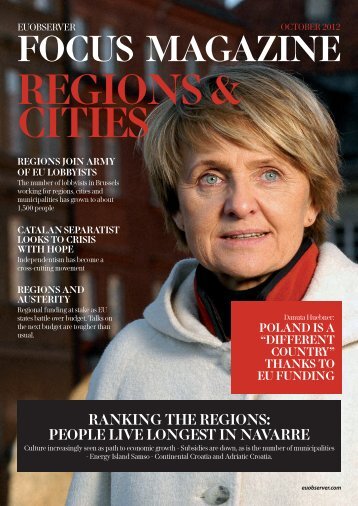Health in a post-pandemic EU
- Text
- Vaccines
- Health
- European
- Pandemic
- Diseases
- Healthcare
- Obesity
- Mrna
- Pharmaceutical
- Medicines
WHO CARES? HEALTH IN A
WHO CARES? HEALTH IN A POST-PANDEMIC EU With an ageing population, the ‘care’ in healthcare needs to become more prominent, experts say. Across Europe, over the last 50 years, life expectancy has increased considerably. Europe is getting older, and people are living longer. By 2050, those aged 65 and over are expected to make up one quarter of the population in Europe. Most babies born since 2000 in France, Germany, Italy, and other developed countries are expected to live to celebrate their 100th birthdays. The projected population pyramid, as a result, will look top heavy. As such, the health challenges faced by the population is going to see a dramatic shift. The paradox at play is that better health has been the main driver of increased longevity of people in Europe, while living longer comes with additional health problems such as cardiovascular disease, diabetes, lower-back complaints, arthritis, leg ulcers, hypertension, and asthma. Diseases previously thought of as ‘silent’, such as type 2 diabetes, hypertension, and some cancers, now get diagnosed earlier and receive better treatment than before. Overall behavioural changes in lifestyle over the years, including reduced exposure to carcinogens such as tobacco smoke have also contributed to increased longevity in the population. This overarching shift means health systems now must focus less on acute care and the prevention of premature death to focusing on providing a continuum of care that promotes health across the life course. With an ageing population, the ‘care’ in healthcare needs to become more prominent, experts say. Confronting inadequacy According to the World Health Organisation, within the European Region 135 million people are living with disabilities, and nearly one in three older people cannot meet their basic needs independently. “The lessons of the pandemic are clear. But are we better prepared now to face a challenge of this scale? What we know is that we need to invest more in our health systems, including in the way we deliver long-term care to those who need it,” said Dr Natasha Azzopardi-Muscat, WHO Europe’s Director of Country Health Policies and Systems. The COVID-19 pandemic exposed the vulnerabilities of care systems, including inadequate long-term care services and poor integration with health-care delivery. In the European Union alone, the initial waves of the pandemic resulted in approximately 200,000 deaths among residents of long-term care facilities. “Medical care can’t address the many issues that we are facing right now,” explains Alfonso Lara-Montero, CEO of the European Social Network, a pan-European network for public authorities with responsibility for social services. “We need to put in place a system which as much as possible supports people in their communities, in their homes, and in their communities by creating an ecosystem of care”. Such demographic and epidemiological transitions that are taking place in Europe suggest a potential problem of resource allocation to the health care sector, and more concretely expose a current lack of staff in the service sector, with subsequent consequences for the future design of healthcare workforces and services. Integrating care In 2018, the European Commission undertook a study of national policies on long-term care. The report found that in most countries, long-term care for the elderly is not a distinct social policy field, with provisions characterised by a fragmentation of responsibilities and consequently a lack of integration between health and social aspects of care provision. As such, there is a lack of formal long-term care facilities across much of Europe, leading to a high incidence of informal care. Across Europe, many actors are pushing for more integrated delivery of care – when people can access the care they need in a timely and comprehensive way, with services ranging from prevention, treatment, long-term care to rehabilitative or palliative care. “Some choices have been made at a policy level to significantly invest in secondary and specialist health care, but not in community care. Community care includes both health and also social care,” Alfonso explains. Investing in community care allows for more work on prevention, which in turn prevents older people from being hospitalised. 13
- Page 1 and 2: MAGAZINE 02 23 A ‘cure’ for obe
- Page 4: TABLE OF CONTENTS HEALTH IN A POST-
- Page 8: A ‘CURE’ FOR OBESITY HEALTH IN
- Page 14: WHO CARES? This is a human rights i
- Page 18: IN SICKNESS AND IN HEALTH HEALTH IN
- Page 22: HEALTH IN A POST-PANDEMIC EU More d
- Page 26: HEALTH IN A POST-PANDEMIC EU “It
- Page 30: HEALTH IN A POST-PANDEMIC EU Stakeh
- Page 34: KEEPING AN EYE ON AI-POWERED DRUGS
- Page 38: HEALTH IN A POST-PANDEMIC EU Prescr
- Page 42: Support truly independent European
Inappropriate
Loading...
Mail this publication
Loading...
Embed
Loading...





















